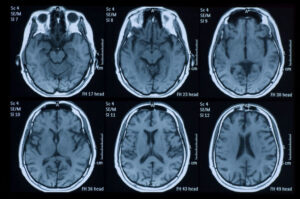WHAT ARE THE LONG-TERM EFFECTS OF A TRAUMATIC BRAIN INJURY?
Few injuries hold the potential to alter a victim’s life as extensively and unpredictably as a traumatic brain injury (TBI).
There are numerous causes and types of a TBI, ranging from a slip and fall to a motor vehicle accident.
Each TBI victim suffers from unique and often-evolving symptoms.
It is important to understand the variety of symptoms that result from a TBI and how the law may entitle you to compensation if someone else’s wrongful actions caused your TBI.
Overview of Traumatic Brain Injuries
An external force that injures the brain and disrupts brain function causes a TBI.
The external force causes the brain to shift, twist, or deform inside the skull, which typically leads to bleeding, swelling, chemical changes, and physical injury to brain tissue.
A blow or impact to the head commonly causes a TBI. A penetrating injury, such as a gunshot wound, can also result in a TBI, as can a violent blow to the body.
Approximately 13.5 million people live with a TBI-related disability in the United States. An additional three million cases occur each year.
While a TBI can happen at any time and in any place, these injuries most often occur in motor vehicle crashes, falls, and blows to the head from an object.
TBI is also the leading cause of injury in the United States for children and adolescents with an estimated 50,000 to 60,000 children hospitalized each year for TBI.
Regardless of the age or gender of the victim, a TBI poses a significant risk of impacting the victim’s long-term quality of life.
This impact is especially severe for children because they have so much life ahead of them.
Symptoms of a TBI
Each TBI victim experiences a unique set of symptoms depending on the severity of the injury, the part of the brain affected, and the body’s response to it.
Potential TBI symptoms can be categorized into three, broad categories:
-Physical: Temporary or permanent loss of consciousness, lightheadedness, feeling dazed, feeling confused, headaches, fatigue, nausea, vomiting, speech problems, convulsions, seizures, change in sleep patterns, fluid drainage from the ears or nose, dilated pupils, breathing issues, reduced bladder control, facial weakness, slow pulse, numbness in arms or legs;
-Sensory: Blurred vision, loss of vision, ringing in ears, change in or loss of taste and smell, sensitivity to light or sound; and
-Cognitive: Problems concentrating, reduced memory recall, loss of the ability to communicate or to understand language, confusion, mood swings, anxiety, depression, aggression, agitation, and disorientation.
Some TBI victims will find that their symptoms lessen over time. Others can face a lifetime of adapting to their TBI symptoms. The relative unpredictability of the symptoms a victim can expect to suffer, and the timeline for healing from a TBI, disrupt victims’ lives and the lives of their families and loved ones.
There is no single, uniform medical treatment plan for a TBI. Medical professionals frequently must adapt to the evolution of TBI symptoms to address them as they arise.
In the initial stages of treating a TBI, an emergency care provider will often focus on stabilizing the patient and ensuring the brain receives sufficient oxygen.
The provider will assess whether surgery is required to remove blood clots, repair skull fractures, or relieve pressure inside the skull. These assessments often require imaging tests including a CT scan to visualize fractures, bleeding, blood clots, and swelling.
Once the patient stabilizes, a doctor must determine the long-term course of care.
For a less-severe TBI, the only prescription might be rest. The doctor might also advise the patient to avoid certain activities, because suffering one TBI heightens the risk of the brain sustaining a subsequent one.
To treat TBI symptoms that persist, a doctor may prescribe medications such as muscle relaxants, diuretics, stimulants, anticonvulsants, and antidepressants.
TBI victims with lasting symptoms might also seek rehabilitative therapy to recover from or adapt to impairments.
Common therapy includes physical therapy, occupational therapy, speech therapy, cognitive therapy, and vocational counseling. Some victims will require continued support and therapy for the rest of their lives.
Assessing Liability for a TBI
If another party’s negligent or intentional actions caused the accident that resulted in your TBI, then that party may owe you compensation for the harm and difficulty you have suffered.
Common parties who may have legal liability for a TBI include:
-Drivers: Motor vehicle accidents are a leading cause of TBIs. A driver whose negligence or recklessness causes an accident will commonly owe damages to accident victims. Violation of any traffic law or regulation can constitute strong evidence of negligence, such as when drivers speed, drive under the influence of alcohol, or fail to heed traffic signals.
-Property owners: A slip and fall or blow from an object on someone’s property have the potential to cause a TBI. Property owners have certain responsibilities to ensure their premises are safe for authorized visitors. A property owner’s unreasonable failure to fix, warn visitors about, or prevent access to a dangerous property condition can result in the owner facing legal liability for damages when a visitor suffers an injury because of it.
-Medical providers: Doctors, nurses, hospitals, and other healthcare providers owe a duty to patients to provide them with a reasonable standard of care. Medical professionals and organizations that fall short of that standard, such as by misdiagnosing a TBI, can face liability for a patient’s poor health outcomes.
-A negligent party’s employer: If a negligent party acted in the scope of their employment at the time of the accident (for example, a delivery driver), their employer may face legal liability. An employer may also face legal liability because of its own negligent actions in connection with training or supervising an employee.
-Manufacturers: If the malfunction of a defective product caused your accident or contributed to the severity of your TBI, then the product manufacturer could owe you damages. Manufacturers have a duty to their customers and the general public not to design, make, and sell products containing dangerous defects that could cause harm.
-Workers’ compensation insurance: Workers who sustain TBIs on the job can usually seek compensation for their injuries through workers’ compensation insurance, which most employers must purchase for their employees. You have a right to receive workers’ comp benefits even if your own actions contributed to an accident that led to your TBI.
These are examples only. TBIs happen in a wide variety of circumstances.
ANYONE whose wrongful actions caused those circumstances to occur could face liability.
A skilled brain injury attorney can help TBI victims explore the causes of their TBI to identify all parties who might owe them compensation.
Potential Compensation for a TBI
Individuals who sustain a TBI often face severe impairments that curtail their ability to work, go to school, or live what they might consider a “normal” life.
By taking legal action against the party or parties at fault for causing their injuries, TBI victims can seek to obtain compensation for the wide-ranging challenges and costs they face.
Every brain injury lawsuit seeking damages differs, but in general, a lawsuit can often seek payment for:
-Medical expenses: There are often significant medical costs associated with treating a TBI, including emergency care, scans and procedures, doctor’s visits, assistive devices like a wheelchair, and prescription medication. A lawsuit can seek compensation for those current and future medical expenses.
-Other expenses: TBI victims frequently incur lots of other expenses they would not have had, were it not for their injury, such as the cost of hiring someone to help with everyday tasks like transportation or childcare. A lawsuit for TBI damages can also seek reimbursement of these current and future costs.
-Lost income: TBI victims often face temporary or permanent disability that leaves them unable to return to work, or that limits the hours they can work. A brain injury lawsuit can seek compensation for the wages and income a TBI victim would have earned, were it not for their injury.
-Pain, suffering, and other life challenges: A TBI affects a victim’s life in numerous other ways that have little to do with financial losses. TBI symptoms can include depression, anxiety, and other mental health struggles. They can limit your ability to participate in activities you once enjoyed. They can change the nature of your most personal and intimate relationships. A lawsuit for damages resulting from a TBI can seek compensation for these non-financial damages.
-Punitive/exemplary damages: In a limited set of cases, a court might award damages that aim to punish extreme and outrageous conduct that led to someone suffering a TBI. Every state has its own rules for when a case calls for these so-called punitive or exemplary damages. Experienced lawyers for TBI victims develop a sense of when to seek punitive damages, and include them in a lawsuit when appropriate.
No lawyer can guarantee that a TBI victim will recover all, or even any, of the damages listed above. Lawyers also cannot promise that a case will yield a specific amount of money.
Lawsuits, by their nature, are adversarial, meaning that the other side will often resist paying the damage they owe. That is why it pays to choose a lawyer who has extensive experience representing victims of TBIs, and who can demonstrate a track record of success in brain injury cases.
How an Experienced Traumatic Brain Injury Lawyer Can Help
Lawyers who represent traumatic brain injury victims regularly possess a wealth of knowledge about the medical, practical, and financial challenges TBI sufferers face in their everyday lives.
That knowledge helps to inform the advice the lawyers give to their clients about when and how to seek compensation through legal action, and often strengthens the lawyers’ ability to force the parties at fault, and their insurers, to pay maximum compensation for a traumatic brain injury.
The specific steps a TBI lawyer might take on behalf of an injured client can vary widely depending on a client’s medical and financial priorities.
To learn more about your rights after suffering a traumatic brain injury, contact the experienced local traumatic brain injury lawyers at The Law Offices Of Gerald L. Marcus for a free consultation at 818-784-8544.
For more info on brain and head injuries and how we can help, CLICK HERE.

